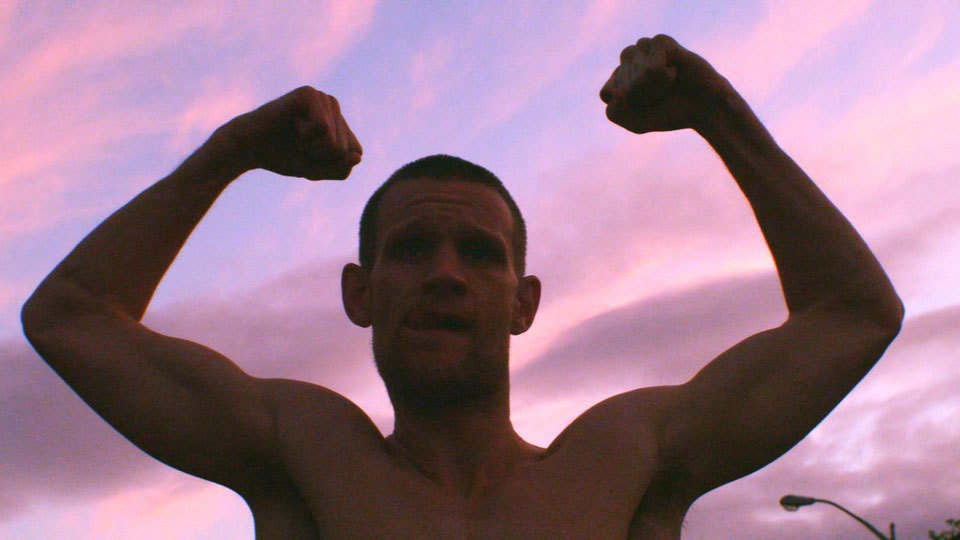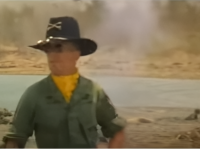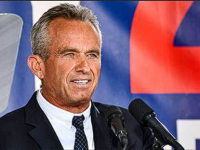Interview. Ryan Gosling: the actor turn director

GREAT. Ryan Gosling is like a cat with nine lives. He’s been a musician, an actor, a Mickey Mouse Club superstar, a meme (it’s the one where he’s wearing a beige jumper made out of boyfriend material, you know you’ve seen it), and a writer.
He made us laugh in Crazy, Stupid, Love., he made us cry in The Place Beyond the Pines and he even made everyone wish they had a boyfriend in The Notebook. Adding one more string to his pretty exceptional bow, his directorial debut has just been released worldwide (and, yes, he wrote the script for that too).
Fusing fantasy and reality, Lost River is a magical tale about a single mother trying to save her family home from being destroyed, a macabre club where murder becomes a form of entertainment, an underwater city, a bully, a rat, and charming young boy called Bones. A dark and twisted version of The Goonies, the film, which stars Matt Smith, Christina Hendricks, Iain De Casestecker, and Soarise Ronan, will take you on a neon-filled, dreamlike journey as one family’s reality turns into a nightmare. Speaking of dreams, Ryan made ours come true when we caught up with him yesterday to talk films, friends and being in charge.
Hey Ryan.
Hey.
We were just being very British and talking about the weather.
Are you excited about it?
Yeah, I really need a tan.
You should get those tan lights. Would you like some water?
Sparkling, please.
We’re ballin’, here.
I know it’s bad for you as it has lots of salt….
Yeah, you’ve got to watch out for those kidney stones.
I feel like it’s too late for that. But anyway, congratulations on your new film. It was brilliant.
Thanks, thank you.
I loved it, but I also hated it. Especially the scene with the poor rat.
It’s fucked up, right?
I did have a feeling that would happen…
You did?
Wasn’t I supposed to? Matt Smith was stroking it for a very long time…
You think this can’t be good…

So where did the idea for the script come from?
I had a chance to go to Detroit. I’m from Canada; let’s just get that out of the way right now. I had a really romantic view of Detroit. Everything cool came from Detroit like Eminem, Motown, Motor City, the refrigerator, the middle class, the American dream. That whole iconic thing. But when I got there I was very surprised. It’s very different now. There’s 40 miles of abandoned neighbourhoods. They were declaring bankruptcy and shutting off the street lamps and there were still families who were trying to hold onto to their homes in these neighbourhoods that are getting torn down or burnt down around them. It seemed like a movie, a fantasy or science fiction. It seemed that their dream was turning into a nightmare and I wanted to make a movie about that.
The film reads almost like a fantasy with spells and underwater cites, but how important was it to anchor your film in reality?
Well we wanted to walk the line between fantasy and reality, and to never have it as one or the other. We wanted to see it through the perspective of these kids who are creating this fairytale for themselves. This idea of a spell, just to make what was happening to them seem important or special. We wanted to shoot the movie in a subjective way, through their lens. Like the club wasn’t supposed to be a state of mind, it’s a real place where money exchanges hands, there’s a backstage, and the murder shows are an act. We wanted to make sure that was clear.
Most films are about suspending disbelief but with Lost River it was more about exposing artifice – there were props, fake blood, reference to performances…
Yeah, we really wanted to show that these things were real. They feel like fantasy but they are real. The club was based on Le Grand Guignol, the Hell Café, and the Death Tavern, which were all real places in Paris in the 20s. They were part of the macabre, death, entertainment scene. We wanted to be clear about that, but again seeing it subjectively from the character’s perceptive and seeing how that could play into the fairytale narrative in their own minds.The film is visually very stylised to the point where light and colour become an integral part of the narrative, did you visualise it in your mind before you filmed it or was this something that evolved?
I filmed for over a year, well over the course of a year, by myself, just going around and shooting. That’s when I realised I was making a film. So the whole aesthetic was kind of established in that period of time.
How important was it to work on location with such an intimate crew of people you knew and trusted?
Yeah, it’s funny, you’re right that it was. It’s weird to be showing it on such a massive scale, as we made it in such a small way. It was like trying to get together people that I admire or who are my friends, and make something together. There were a few I hadn’t worked with like Barbara Steele and Matt Smith.
Matt was brilliant, but my favourite character was definitely the taxi driver.
Yeah, Reda (Kateb). The movie is about a broken home; it’s a world without a father. There’s no positive male presence in the movie, and so Reda was supposed to represent that. He would come in and fill that spot, you know? We needed to find someone that was a decent guy. He’s such a poetic guy, we just drove around filming him and he was talking about what he was seeing. He brought so much to that character.
It’s interesting that you said that because I found that there were a lot of similarities betweenLost River and The Place Beyond the Pines, in terms of the loss of a father. I cried in that film, a lot.
Oh really?
Yeah, because I don’t have a father and I was watching it on the plane and I was literally blubbing all the way to LA. But anyway was that an intentional similarity?
Haha. I don’t know, I mean with this we weren’t addressing where the father was. It was just supposed to be a visual representation of what it feels like to grow up that way, you know? It worked for this movie, but it’s not like an overall theme for me, but I know it is for Derek Cianfrance. For him it’s like the theme of his films.
When you were making the movie did you think about what came after it like showing it to hundreds of people, getting reviews, doing press?
I wasn’t at the time. Mostly I was taking it one step at a time and what I love about the movie was that it really happened in this very natural way. I was shooting on my own, and then there were more people, and now we’re talking about it. There was no singular moment where I thought *clicks* I’m gonna direct, this is what it’s gonna be.
Did you feel a like a director or the guy in charge?
I did feel a responsibility for everyone. They’re all coming to a dangerous area to shoot this thing; they’re all putting themselves out there for the film so you do feel responsible.
Ok last question, what are you going to do next?
I’m gonna act in a film called The Big Short. I’m going to work with Steve Carell, again, and some other guys like Brad Pitt and Christian Bale. I’ve never worked with them before so I’m excited. Adam McKay is doing it, do you like his movies? He does Anchorman and Step Brothers.
Oh cool! So it’s a comedy?
It’s not, but I hope it will end up being funny. (I-D)










